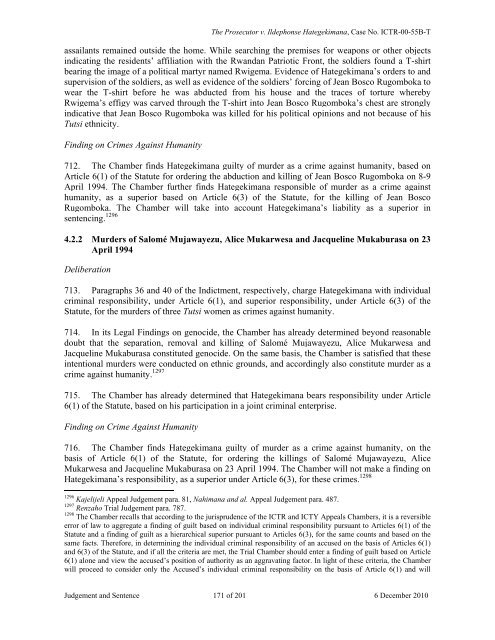Hategekimana - JUDGEMENT & SENTENCE - Refworld
Hategekimana - JUDGEMENT & SENTENCE - Refworld
Hategekimana - JUDGEMENT & SENTENCE - Refworld
You also want an ePaper? Increase the reach of your titles
YUMPU automatically turns print PDFs into web optimized ePapers that Google loves.
The Prosecutor v. Ildephonse <strong>Hategekimana</strong>, Case No. ICTR-00-55B-T<br />
assailants remained outside the home. While searching the premises for weapons or other objects<br />
indicating the residents’ affiliation with the Rwandan Patriotic Front, the soldiers found a T-shirt<br />
bearing the image of a political martyr named Rwigema. Evidence of <strong>Hategekimana</strong>’s orders to and<br />
supervision of the soldiers, as well as evidence of the soldiers’ forcing of Jean Bosco Rugomboka to<br />
wear the T-shirt before he was abducted from his house and the traces of torture whereby<br />
Rwigema’s effigy was carved through the T-shirt into Jean Bosco Rugomboka’s chest are strongly<br />
indicative that Jean Bosco Rugomboka was killed for his political opinions and not because of his<br />
Tutsi ethnicity.<br />
Finding on Crimes Against Humanity<br />
712. The Chamber finds <strong>Hategekimana</strong> guilty of murder as a crime against humanity, based on<br />
Article 6(1) of the Statute for ordering the abduction and killing of Jean Bosco Rugomboka on 8-9<br />
April 1994. The Chamber further finds <strong>Hategekimana</strong> responsible of murder as a crime against<br />
humanity, as a superior based on Article 6(3) of the Statute, for the killing of Jean Bosco<br />
Rugomboka. The Chamber will take into account <strong>Hategekimana</strong>’s liability as a superior in<br />
sentencing. 1296<br />
4.2.2 Murders of Salomé Mujawayezu, Alice Mukarwesa and Jacqueline Mukaburasa on 23<br />
April 1994<br />
Deliberation<br />
713. Paragraphs 36 and 40 of the Indictment, respectively, charge <strong>Hategekimana</strong> with individual<br />
criminal responsibility, under Article 6(1), and superior responsibility, under Article 6(3) of the<br />
Statute, for the murders of three Tutsi women as crimes against humanity.<br />
714. In its Legal Findings on genocide, the Chamber has already determined beyond reasonable<br />
doubt that the separation, removal and killing of Salomé Mujawayezu, Alice Mukarwesa and<br />
Jacqueline Mukaburasa constituted genocide. On the same basis, the Chamber is satisfied that these<br />
intentional murders were conducted on ethnic grounds, and accordingly also constitute murder as a<br />
crime against humanity. 1297<br />
715. The Chamber has already determined that <strong>Hategekimana</strong> bears responsibility under Article<br />
6(1) of the Statute, based on his participation in a joint criminal enterprise.<br />
Finding on Crime Against Humanity<br />
716. The Chamber finds <strong>Hategekimana</strong> guilty of murder as a crime against humanity, on the<br />
basis of Article 6(1) of the Statute, for ordering the killings of Salomé Mujawayezu, Alice<br />
Mukarwesa and Jacqueline Mukaburasa on 23 April 1994. The Chamber will not make a finding on<br />
<strong>Hategekimana</strong>’s responsibility, as a superior under Article 6(3), for these crimes. 1298<br />
1296 Kajelijeli Appeal Judgement para. 81, Nahimana and al. Appeal Judgement para. 487.<br />
1297 Renzaho Trial Judgement para. 787.<br />
1298 The Chamber recalls that according to the jurisprudence of the ICTR and ICTY Appeals Chambers, it is a reversible<br />
error of law to aggregate a finding of guilt based on individual criminal responsibility pursuant to Articles 6(1) of the<br />
Statute and a finding of guilt as a hierarchical superior pursuant to Articles 6(3), for the same counts and based on the<br />
same facts. Therefore, in determining the individual criminal responsibility of an accused on the basis of Articles 6(1)<br />
and 6(3) of the Statute, and if all the criteria are met, the Trial Chamber should enter a finding of guilt based on Article<br />
6(1) alone and view the accused’s position of authority as an aggravating factor. In light of these criteria, the Chamber<br />
will proceed to consider only the Accused’s individual criminal responsibility on the basis of Article 6(1) and will<br />
Judgement and Sentence 171 of 201 6 December 2010

















